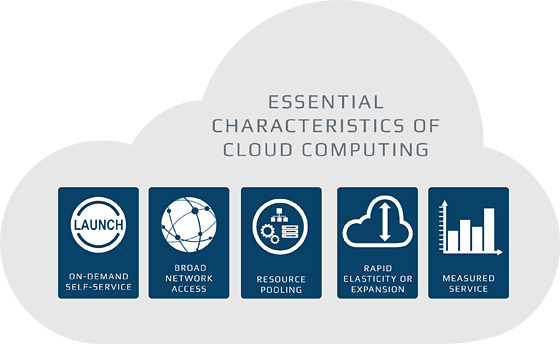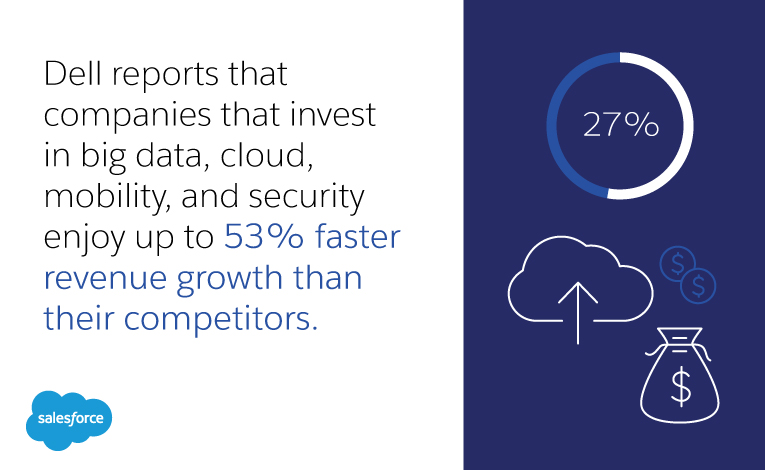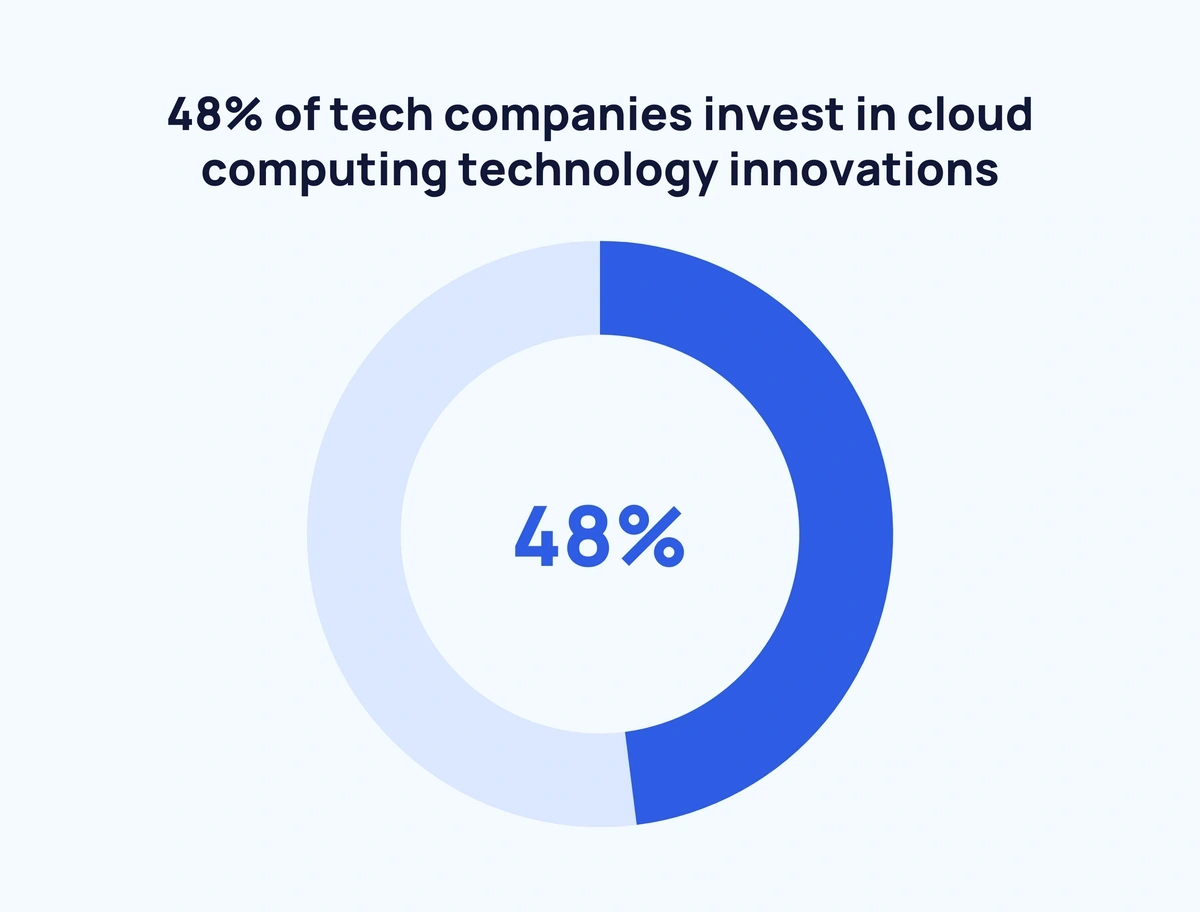The global market for cloud computing is experiencing an astonishing surge, and by 2025, it's set to skyrocket to an impressive $168 billion. Once dominated by enterprise-level companies, this exciting trend is now capturing the attention of small and medium-sized businesses.
So, what exactly is cloud computing? What are its main deployment models and benefits? Why should your business jump aboard its adoption? You will find answers in this detailed guide. Let's kick things off by delving into the essentials!
Looking for senior, high-performing Cloud engineers, fully assessed and ready to join your project? Don’t put it off any longer. Hire our high-performing Cloud developers today→
What is cloud computing?
Cloud computing, in simple terms, is a revolutionary computing model that operates through the internet. It encompasses servers, networks, storage, development tools, and applications, all made accessible through the web. Rather than burdening organizations with significant investments in purchasing equipment, training staff, and managing maintenance, cloud computing offers a seamless alternative. It allows businesses to rely on cloud service providers to cater to their computing needs partially or entirely.
Imagine the possibilities when you no longer have to worry about infrastructure headaches or costly hardware upgrades. With cloud computing, you can focus on what truly matters – accelerating your business growth and achieving your goals with ease and efficiency.
Key characteristics of cloud computing
Cloud computing boasts five key characteristics that set it apart as a game-changer in the world of technology:

- Internet access: With a public cloud environment, you can seamlessly connect to data and applications from anywhere, anytime, thanks to the power of the internet.
- Measured service: Cloud computing operates on a pay-as-you-go basis, just like a utility company measures your consumption of water, electricity, or gas. You only pay for what you use, ensuring cost efficiency.
- On-demand self-service: Forget about lengthy setups and manual configurations. In the cloud, you can request and access services quickly and easily, without the need for any manual intervention.
- Shared resource pooling: Collaboration reaches new heights with cloud computing's multi-tenancy model. Instead of duplicating applications for each user, several users can efficiently share a single application, tailoring it to their specific needs.
- Rapid elasticity: Adaptability is key, and cloud platforms excel in this area. You can effortlessly scale your resource usage levels up or down, ensuring your organization meets changing demands with ease.
Deployment models of cloud computing
Cloud computing offers several deployment models to cater to different business needs. Let's explore the four main deployment models: public cloud, private cloud, hybrid cloud, and multi-cloud.
1. Public Cloud
This model involves accessing computing resources hosted on data centers managed by third-party cloud service providers through an internet connection. Organizations opt for the public cloud to avoid the hassle of owning and maintaining on-premise resources. In a shared environment, multiple organizations or tenants leverage the same infrastructure. The industry's leading hyperscalers, including Microsoft (Azure), Amazon (AWS), Alibaba (Alicloud), and Google (Google Cloud), offer massive scaling capabilities, while others like IBM and Oracle also provide cloud services.
2. Private Cloud
Ideal for businesses seeking enhanced control over resources and security, the private cloud model relies on servers owned and maintained by the organization. Accessible via the internet or a private internal network, the private cloud ensures compliance with specific regulatory and compliance requirements, such as HIPAA for healthcare or GDPR for data protection.
3. Hybrid cloud
Many organizations find a perfect solution in the hybrid cloud approach, which combines various cloud environments. Typically, it includes a mix of public cloud, private cloud, and sometimes on-premise infrastructure. Effective communication or orchestration between these deployments creates a true hybrid cloud architecture. This approach provides flexibility, security compliance, and eliminates reliance on a single cloud provider. Hyperscalers now offer private cloud options in public environments (e.g., VMware on AWS, Azure VMware Services), blurring the lines between "public" and "private" into "dedicated" and "shared."
4. Multi-cloud
In a multi-cloud setup, an organization utilizes services from multiple public cloud providers. This specific case of hybrid cloud empowers businesses to cherry-pick the best offerings from different providers, maximizing their advantages and avoiding vendor lock-in.
Looking for senior, high-performing Cloud engineers, fully assessed and ready to join your project? Don’t put it off any longer. Hire our high-performing Cloud developers today→
Service categories of cloud computing
Let's explore the three service categories of cloud computing, each offering distinct advantages for businesses:
1. Software as a Service (SaaS)
SaaS is a widely used cloud application service that grants organizations easy access to software applications. With SaaS, you access specific applications hosted on remote servers managed by a third-party provider. This subscription-based model allows access through web browsers, eliminating the need for on-device software downloads or updates. Popular SaaS products include Salesforce, Workday, and Microsoft Office 365. Businesses opt for SaaS to quickly enable cloud system access with minimal database management and service provider interaction. It's perfect for web and mobile access applications, short-term projects requiring quick collaboration, and startups launching ecommerce websites without server issues or software development.
2. Platform as a Service (PaaS)
PaaS is a top choice for businesses seeking to create unique applications without significant financial investments. With PaaS, organizations access a pre-defined software development environment, which aids in building, testing, and running applications. Developers benefit from not having to start from scratch, allowing them to focus on the creative side of software development rather than tedious tasks like writing extensive code or managing updates and security patches. Examples of PaaS products include Google App Engine, web servers, and SQL servers.
3. Infrastructure as a Service (IaaS)
For simplicity, IaaS is the ideal option. It involves migrating an organization's hardware to the cloud, renting servers and data storage instead of maintaining its infrastructure. IaaS offers the same technologies and capabilities as a traditional data center, granting full control over server instances. System administrators handle aspects like databases, applications, runtime, and security, while the cloud provider manages servers, hard drives, networking, and storage.
Your cloud migration strategy needs to consider the deployment model and service category.
Leading cloud computing platforms
The cloud computing landscape is led by three prominent platforms: Amazon Web Services (AWS), Microsoft Azure, and Google Cloud Platform (GCP). These major players collectively dominate over half of the global market share in cloud infrastructure as a service (IaaS), making them the undisputed leaders in the cloud computing race.
- Amazon Web Services (AWS): For years, Amazon has been a dominant force in cloud services and continues to expand at an impressive rate. AWS boasts a vast array of over 175 services, covering virtually every major aspect of cloud computing. Notably, AWS offers serverless options, allowing you to run applications, manage cloud storage, integrate applications, and scale automatically without dealing with server management. While AWS is immensely popular, it's important to consider that its complexity and potential pricing confusion might not always make it the best choice.
- Microsoft Azure: Azure is Microsoft's robust cloud platform, providing a comprehensive set of cloud services for developers and IT professionals. It enables the building, deployment, and management of ASP.NET Core web applications through a global network of data centers. Azure offers a rich variety of both IaaS and PaaS services, effectively handling dependencies and streamlining cloud deployment processes.
- Google Cloud Platform (GCP): Google's cloud platform, GCP, offers a suite of public cloud computing services. It features a set of virtual machines (VMs) running on Google's powerful infrastructure. GCP also provides container services, various cloud storage options, and cutting-edge big data solutions. While GCP excels in advanced services, it may come with a trade-off in terms of user-friendliness.
When choosing a cloud platform, it's essential to evaluate your specific business requirements and objectives. Weighing factors like complexity, pricing, services offered, and user experience will help you make an informed decision to leverage the full potential of cloud computing for your organization.

Top applications of cloud computing
Cloud technology offers several applications in various fields like business, data storage, entertainment, management, social networking, education, art, GPS, to name a few. Let’s start elaborating on the top 11 applications of cloud computing.
- Online Data Storage: Cloud storage allows businesses to store and access files, images, audio, and videos on remote servers, saving space and reducing costs associated with on-premise storage. It enables seamless access to data from multiple devices.
- Backup and Recovery: Cloud service providers offer secure backup solutions, ensuring data can be easily recovered in case of disasters, minimizing potential data loss and downtime.
- Big Data Analysis: Cloud computing plays a vital role in analyzing vast amounts of big data, offering unlimited storage capacity and powerful processing capabilities to gain valuable business insights.
- Testing and Development: Cloud-based environments provide a flexible and scalable solution for product development, testing, and deployment, reducing setup time and resource costs.
- Antivirus Applications: Cloud-based antivirus software monitors and mitigates security threats in real-time, providing a centralized and effective solution for safeguarding organizational systems.
- E-commerce: Cloud applications empower e-businesses to respond quickly to emerging opportunities, manage customer and product data efficiently, and streamline operational systems.
- E-Learning: Cloud computing revolutionizes education with e-learning platforms, distance learning programs, and student information portals, creating a collaborative and accessible learning environment.
- IoT (Internet of Things): With cloud computing and real-time data analytics, IoT devices seamlessly communicate and share data, enhancing automation and interconnectivity.
- Social Networking: Social media platforms like Facebook, Twitter, and LinkedIn utilize cloud computing through the Software as a Service (SaaS) model, enabling users to share information, photos, and messages globally.
- Entertainment Applications: Cloud computing supports on-demand entertainment content delivery, ensuring a seamless customer experience for streaming services, online games, and video platforms.
- Management Applications: Cloud-based management tools like Evernote facilitate data storage, formatting, and sharing, ensuring easy access to notes from any device with robust security and data redundancy.
These applications demonstrate the widespread impact of cloud computing across various domains, fueling innovation, scalability, and cost-efficiency for businesses and enhancing convenience and connectivity for individuals worldwide.

12 benefits of cloud computing
Still, there are those leaders that are remaining hesitant about committing to cloud-computing solutions for their organizations. So, we’d like to take a few minutes and share 12 business advantages of cloud computing. Let's delve deeper into the benefits of embracing cloud app development and discover how it can fuel your business success.
- Cost savings: Cloud computing offers pay-as-you-go pricing and smart resource management. Half of all CIOs and IT leaders reported cost savings. (Bitglass survey)
- Security: With full-time monitoring and encryption, your sensitive information is safer than ever. 94% of businesses saw improved security after switching to the cloud. (RapidScale)
- Flexibility: Cloud's scalability and instant bandwidth access free up your team's time for what truly matters. 65% of respondents said “the ability to quickly meet business demands” was one of the most important reasons a business should move to a cloud environment. (The InformationWeek survey)
- Mobility: Cloud computing enables mobile access to data, keeping your team in the loop and clients impressed. Join the 6.84 billion smartphone users benefiting from this convenience.
- Insight: Data is the new currency of success, and cloud analytics holds the key to unlocking its true potential. Within the vast sea of data encompassing your customer interactions and business operations lie invaluable insights, ready to drive action and boost your bottom line. With your information securely stored in the cloud, you can effortlessly deploy tracking mechanisms and generate customized reports, enabling in-depth analysis across your entire organization.
- Increased collaboration: Experience seamless teamwork through cloud computing. Your team can easily view and share information across a secure cloud-based platform, fostering efficient collaboration.
- Quality control: In a cloud-based system, all documents reside in one place and standardized format. This guarantees data consistency, minimizes human error, and keeps a clear record of revisions or updates.
- Disaster recovery: Cloud-based services offer rapid data recovery, reducing downtime and safeguarding your reputation during unforeseen events.
- Loss prevention: With countless laptops lost weekly at major airports, a cloud-based server ensures your valuable information remains safe and accessible from any internet-connected device, even if your regular computer is unavailable.
- Automatic software updates: Cloud applications refresh and update themselves, sparing your IT department from manual organization-wide updates. Embrace this efficient approach and save valuable time and resources.
Looking for senior, high-performing Cloud engineers, fully assessed and ready to join your project? Don’t put it off any longer. Hire our high-performing Cloud developers today→

Why switch to cloud computing?
Cloud technology has become a game-changer for companies, offering a multitude of benefits that drive growth and success. With the cloud, businesses can swiftly scale, innovate, and adapt to changing circumstances, even in times of crisis. It streamlines operations, enhances efficiency, and reduces IT costs, leading to sustainable growth.
The cloud's flexibility and reliability enable improved performance, allowing organizations to embrace AI and machine learning for faster time-to-market and innovation. As a result, productivity surges, remote workforces are supported seamlessly, and operational efficiency skyrockets.
According to the Future Systems research, companies with a strategic technology approach experience remarkable financial success, with over twice the average revenue growth compared to slow adopters. An impressive 95% of leaders have already embraced advanced cloud services, reaping the rewards of their forward-thinking approach.
Next step
To secure the migration to Cloud, hire Index.dev Cloud developers who stay up to date on the latest cloud server technologies.
✔Hire quickly: Our Cloud developers are ready to start work immediately, ensuring you don't miss out on promising talent available in the market.
✔Quality developers: Developers we provide are pre-screened and expertly vetted, as we select the top 5% who have passed extensive assessments. We also consider their technical skills, English language proficiency, and culture fit aspects to ensure the perfect match for your engagement.
✔Flexible terms: Hiring through Index.dev comes with flexibility as you won't have to deal with employment fees or overheads. Our experts are available to discuss any issues, concerns, or onboarding processes, making the hiring process smooth and efficient.